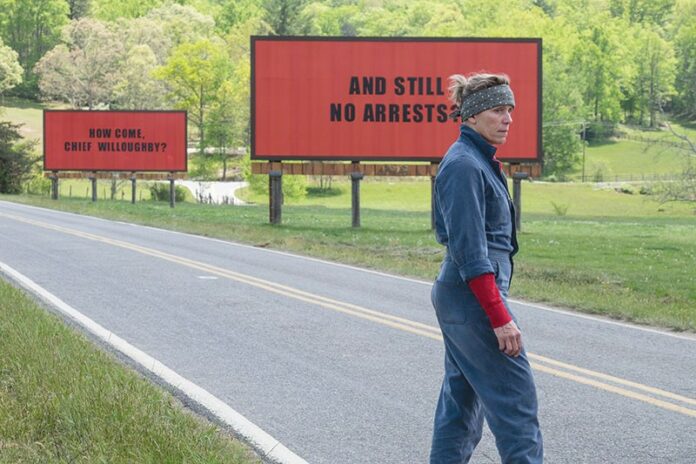A person can be composed of a set of perfectly good facial features—a strong chin, a proud nose, kind eyes, a generous mouth—and still be basically ugly, and that’s the case with Three Billboards Outside Ebbing, Missouri.
Short hair tied up with a bandanna, dressed in coveralls as if she worked at a Jiffy Lube instead of an Ozark gift shop, Mildred (Frances McDormand) has a sudden inspiration to harass the police force in her town. Seven months previously, her daughter was raped and burned to death, and no one has been arrested yet. She decides to tell the police chief off through a set of billboards. This embarrasses the terminally ill Andy Griffith–like chief (Woody Harrelson), revered in the town in spite of (or because of) the police department’s reputation for torturing black prisoners. Dixon, his assistant—a drunk and sometimes vicious Barney Fife, well played by Sam Rockwell—is far more angry.
Through her bereavement, Mildred has a license to spit venom. It’s a role that runs a small gamut. There are little nuggets of surprise embedded in the monotony of her forcefulness, and it’s a powerful part: kicking kids, throwing firebombs, maiming a dentist and usually having the last word. But “powerful” is also a term that defines a bully.
One moment of tenderness has Mildred addressing a deer, telling it, and the audience, that she doesn’t believe it’s a reincarnation of her lost daughter. Yet there is the deer—we’ve seen the symbol of hope, and writer-director Martin McDonagh (In Bruges) gets it both ways.
Caleb Landry Jones (Byzantium) is a relief from the ambient overheatedness as a self-amused billboard salesman. Harrelson is at his most benign as the police chief, even if McDonagh is at his roughest when he tries to write tenderly.
‘Three Billboards Outside Ebbing, Missouri’ is playing in wide release in the North Bay.









